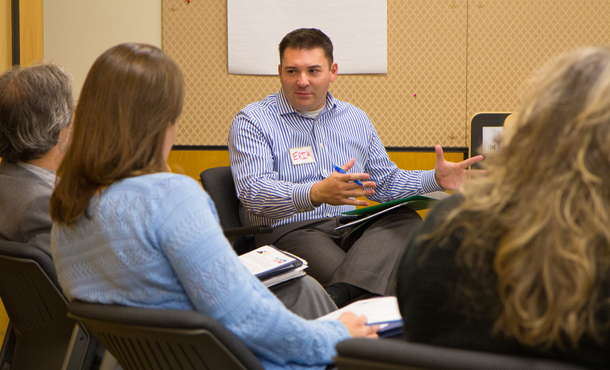Cheryl Cooper drives 45 miles to work each morning. Along the way, she pictures the nearly 114,000 people, standing shoulder to shoulder, who are served by the Blue Ridge Area Food Bank each month.
This startling image characterizing the depth of poverty in the Shenandoah Valley was one of many shared during the recent Interfaith Discussion on Poverty hosted by Eastern Mennonite University.
Cooper, director of agency relations and programs at the Verona-based non-profit organization, was among approximately 30 representatives of local social service providers who met with national public policy advocates from the Virginia Interfaith Center for Public Policy and the Center for American Progress (CAP). The event was also sponsored by the Harrisonburg Community Health Center and EMU’s nursing program.
Virginia Interfaith Center is Virginia’s oldest faith-based advocacy group working for social justice “and strategic change that makes a difference over time,” said Marco Grimaldo, president of the Richmond-based non-profit. The organization is the Virginia affiliate of the Center for American Progress’s Half in Ten campaign, which aims to cut national poverty rates in half in 10 years.
The two organizations had previously collaborated on similar stakeholder discussions in Petersburg and Manassas. The Harrisonburg area, however, has a uniquely diverse population, with a high rate of uninsured and a significant 71 percent of students eligible for free or reduced-price lunch (an accurate indicator of poverty).
“We’re interested in seeing the connections on the ground here in Harrisonburg to federal policy initiatives,” said Erik Stegman, associate director of CAP’s Half in Ten campaign. “We want to know what advocacy is going on at the local levels, what opportunities we have to assist in this advocacy, and how we can knit together these local movements to get these stories out to the media on the national level.”
During the three-hour meeting, several EMU social work and nursing students received a firsthand look at how public policy advocates network with and support local service providers. Local participants represented a diverse group of community-based programs in Harrisonburg and Rockingham County, from health care and housing agencies, immigrant service organizations, community service boards, food banks, and faith-based agencies.
An overview of local issues relevant to the indicators of hunger, healthcare, housing and employment was provided by Cooper, of the Blue Ridge Food Bank; Christopher Nye, of the Harrisonburg Community Health Center; Candy Phillips, executive director of First Step, which offers a variety of services addressing domestic abuse; and EMU professor of social work Carol Hurst. Following the presentations, participants broke into focus groups for discussion.
EMU’s partnership in the event derived from a long-term relationship with co-sponsor Harrisonburg Community Health Center, according to professor of nursing Ann Hershberger.
“The EMU nursing program is known for our holistic and multilevel approach to health that includes individuals, families, groups and communities,” she said. “Understanding factors that influence poverty in the community is essential to the provision of well-targeted and relevant care.”
For students in Hurst’s “Social Work 3” class, listening to the interwoven concerns of local professionals helped to conceptualize the foundational principles of macro and mezzo practice (macro practice typically involves large-scale interventions that can affect large systems, while mezzo practice describes more intermediate work with groups, such as community organizations and schools).
“This is a great discussion for them to be involved in right now. My students are learning about assessing communities and working with other community partners who are engaging with the most vulnerable in our communities,” said Hurst. “Traditionally you think of social work as person-to-person, but there is an aspect of social work that is working to change and improve communities, and to make a difference on the policy level.”
“This event reinforced the importance of coalition building, community needs assessments, and collaboration,” said senior social work major McKenzie Sauder. “When agencies can work together, clients can receive services faster and be linked to resources they are in need of. The importance of research and of listening to others’ perspectives was reinforced.”
Senior Michelle Zook, also preparing for a career in social work, was reminded of “the great importance of knowing the demographics of the area I will be working in and the specific social issues that may be impacting area residents.”
Suggestions that emerged from the small-group discussions included public transportation to remote parts of the county; affordable daycare; subsidies to encourage area farmers to sell locally; increased health literacy initiatives; better access to essential services; and more social workers who can help those in need navigate an increasingly complex health care system.
